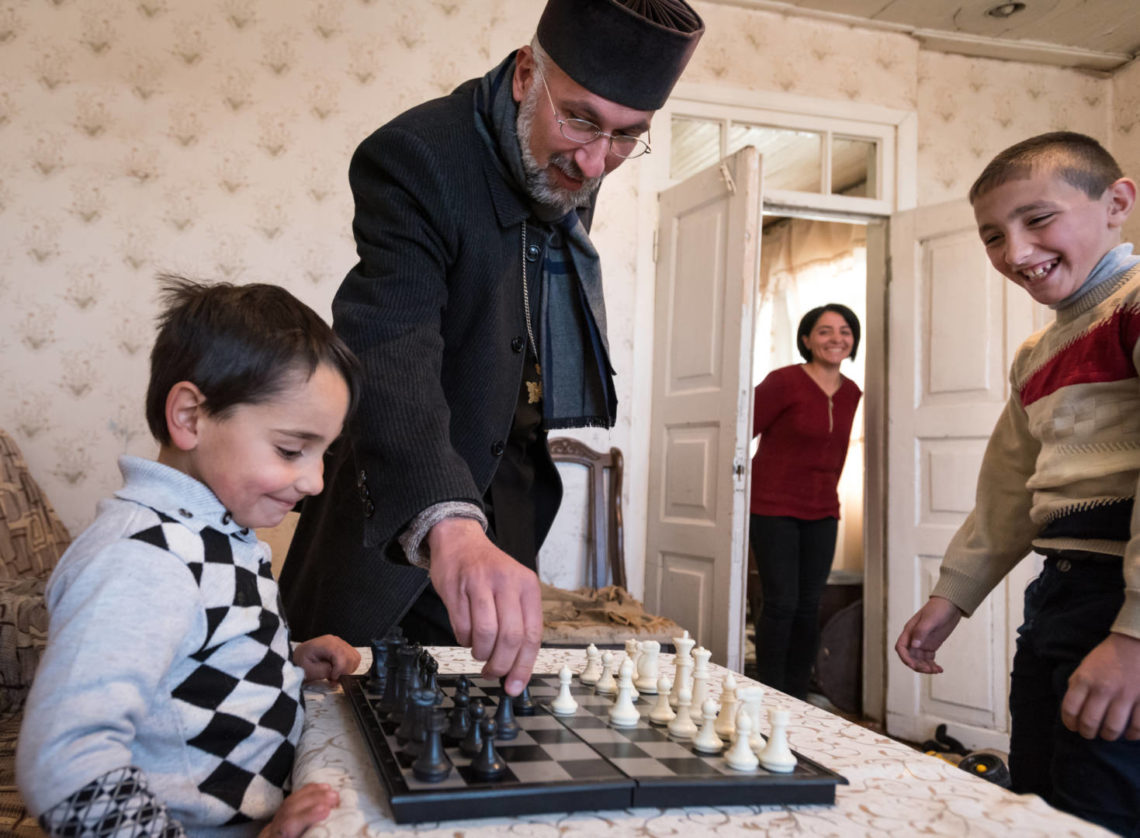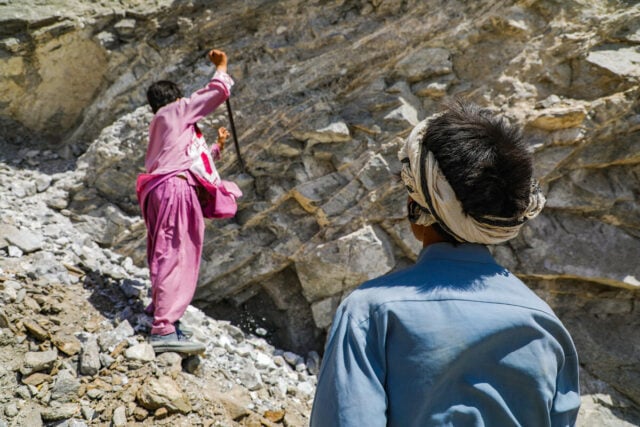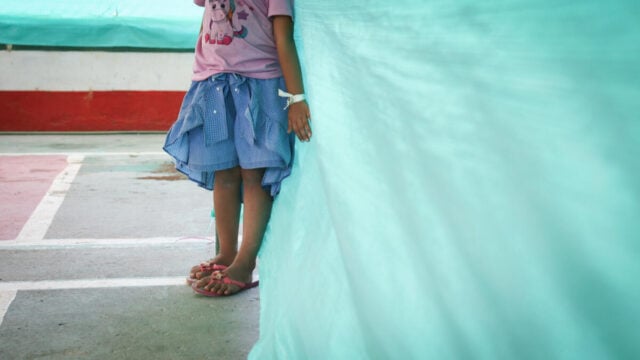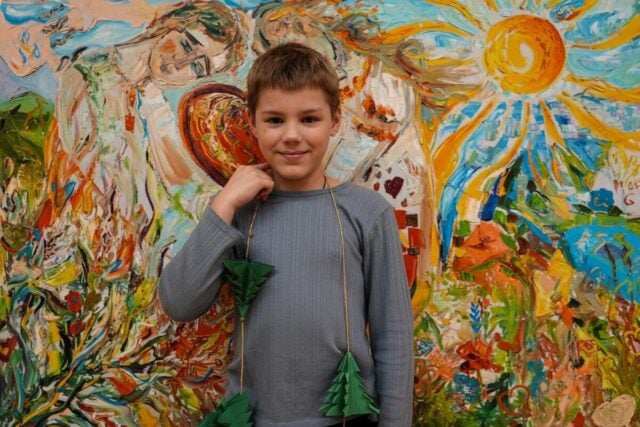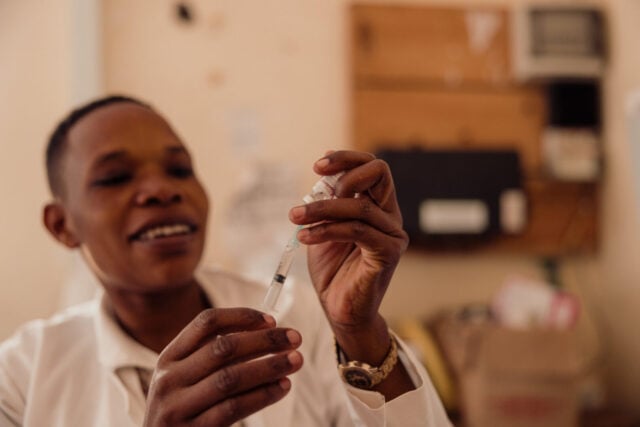What conjures up your fondest childhood memories? Playing outside with friends late into warm summer evenings? The scent of freshly baked cookies? Performing in school plays? Reading your favorite bedtime stories with a loved one?
The memories are different for each of us, but most likely, they started with a caring parent or another adult — someone who loved you, affirmed you, and kept you safe.
These special people encouraged you to develop your skills and talents, to speak up, and to share your opinions. They weren’t perfect, but they knew they could turn to helpers — spiritual leaders, teachers, doctors, and nurses — to help ensure your journey to adulthood was healthy and life-giving.
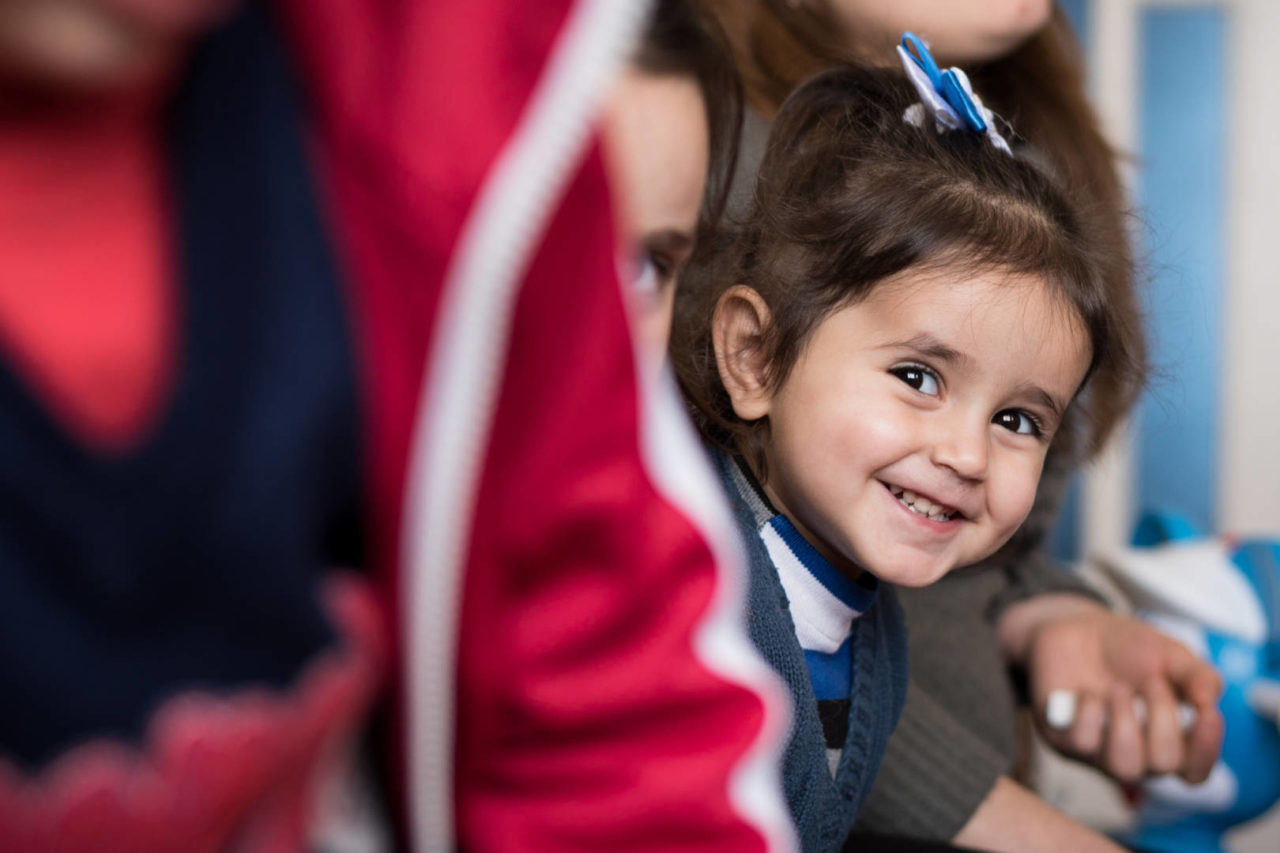
This is why World Vision aims to equip parents, teachers, and church leaders in Armenia to nurture children. The ultimate goal is to protect childhood, allowing kids to be kids. That work begins before children are born—especially for girls, who, even in modern societies, can be unwanted.
Prenatal sex selection is one of the most widespread forms of gender-based violence in Armenia. World Vision’s child protection work continues through adolescence and young adulthood, meeting children at their current life stage with programs designed to create healthier environments and greater opportunities.
Changing attitudes about girls
Nearly 30 years after a devastating earthquake in Gyumri, Armenia’s second-largest city, some crumbled buildings remain. The rubble is a silent monument to the terrible destruction and loss of 25,000 lives.
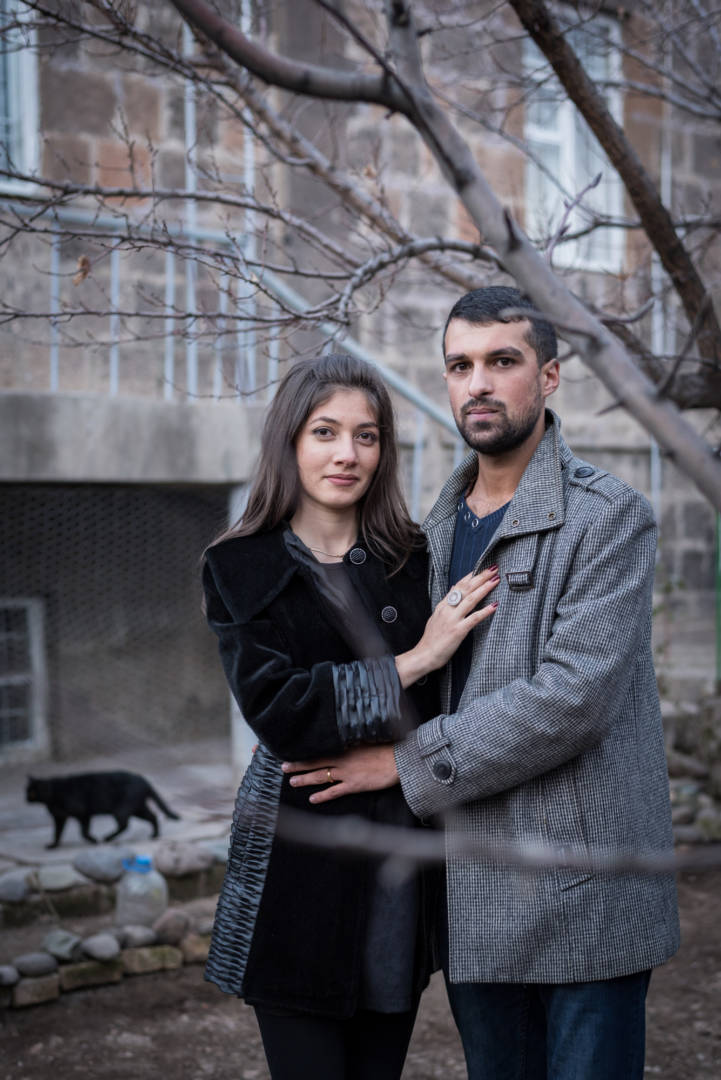
But elsewhere, old stone buildings are being refurbished, turned into hotels or museums. High- rise apartment buildings dot the skyline. Rebuilt churches stand tall in the main square, a testament to the faith of this country’s people.
It’s in this city, this mix of old and new, that newlyweds Mikael Tutoyan, 23, and Gohar Avetisyan, 20, live.
For Mikael, their new life together has been filled with anxiety — particularly this morning, when he and Gohar had an ultrasound to learn the sex of their baby.
“I was impatient for that. I was expecting to have a boy,” says Mikael. “When she told us it was a girl, I felt like boiled water was on me. I was shocked.”
It wasn’t that he wouldn’t have eventually welcomed a girl into his family, but in Armenia, the societal pressure for a boy — especially as your firstborn — is high.
“It’s okay to have a girl child later,” says Mikael.
The United Nations Population Fund reports that, of all the girls conceived in Armenia, about 1,400 are not born each year. For such a small country — with a population of about 3 million and just over 40,000 babies born annually — this is considerable. Armenia is third among countries with the most highly skewed sex ratios at birth.
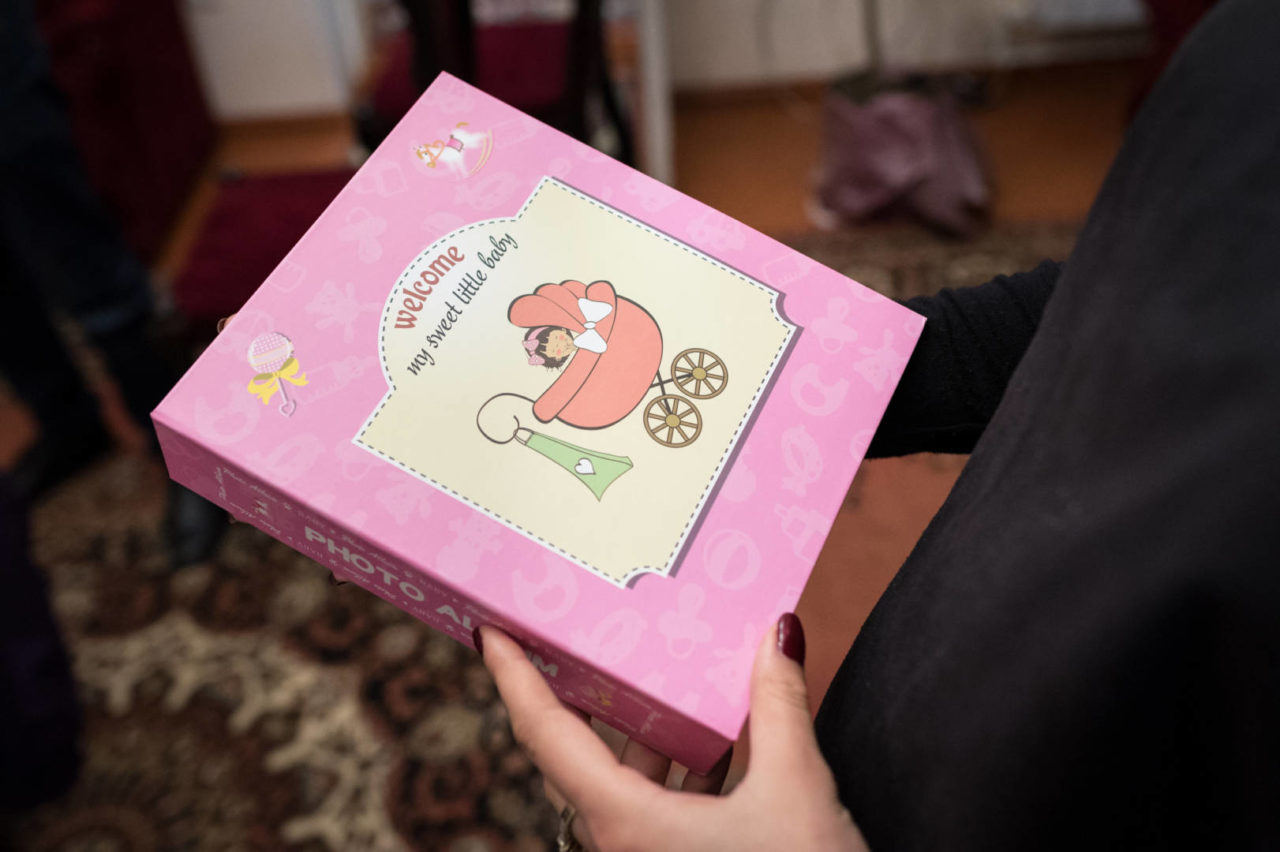
Only China and Azerbaijan, Armenia’s neighbor to the east, rank higher. The normal sex ratio at birth ranges from 102 to 106 males for every 100 females. But in Armenia, between 1993 and 2010, the ratio was 110 to 120 boys for every 100 girls.
Ironically, Mikael’s job as a social worker has him working with other families to change deeply ingrained gender biases — to advocate for the girl child. But the yearning to have a boy runs deep, even in this younger generation.
World Vision research also shows that Armenian men and women strongly emphasize the role of boys in carrying on the family name. Parents typically regard sons as assets, viewing males as breadwinners and caregivers for aging parents. Daughters are commonly viewed as liabilities who will leave the family after marriage.
The afternoon of the ultrasound, Mikael ran into fellow social worker and World Vision staff member Arpine Sargsyan, who could tell the results from his crestfallen expression. Rather than commiserating, though, she scolded him, saying he shouldn’t fall victim to societal pressures.
She then invited him to attend a World Vision Caring for Equality training session with Gohar. Over the span of 15 weeks, with the support of World Vision staff, couples and youth in this program examine their beliefs about gender and power. The workshops encourage shared decision-making by couples and look deeply at the ingrained bias favoring boys in Armenian culture.
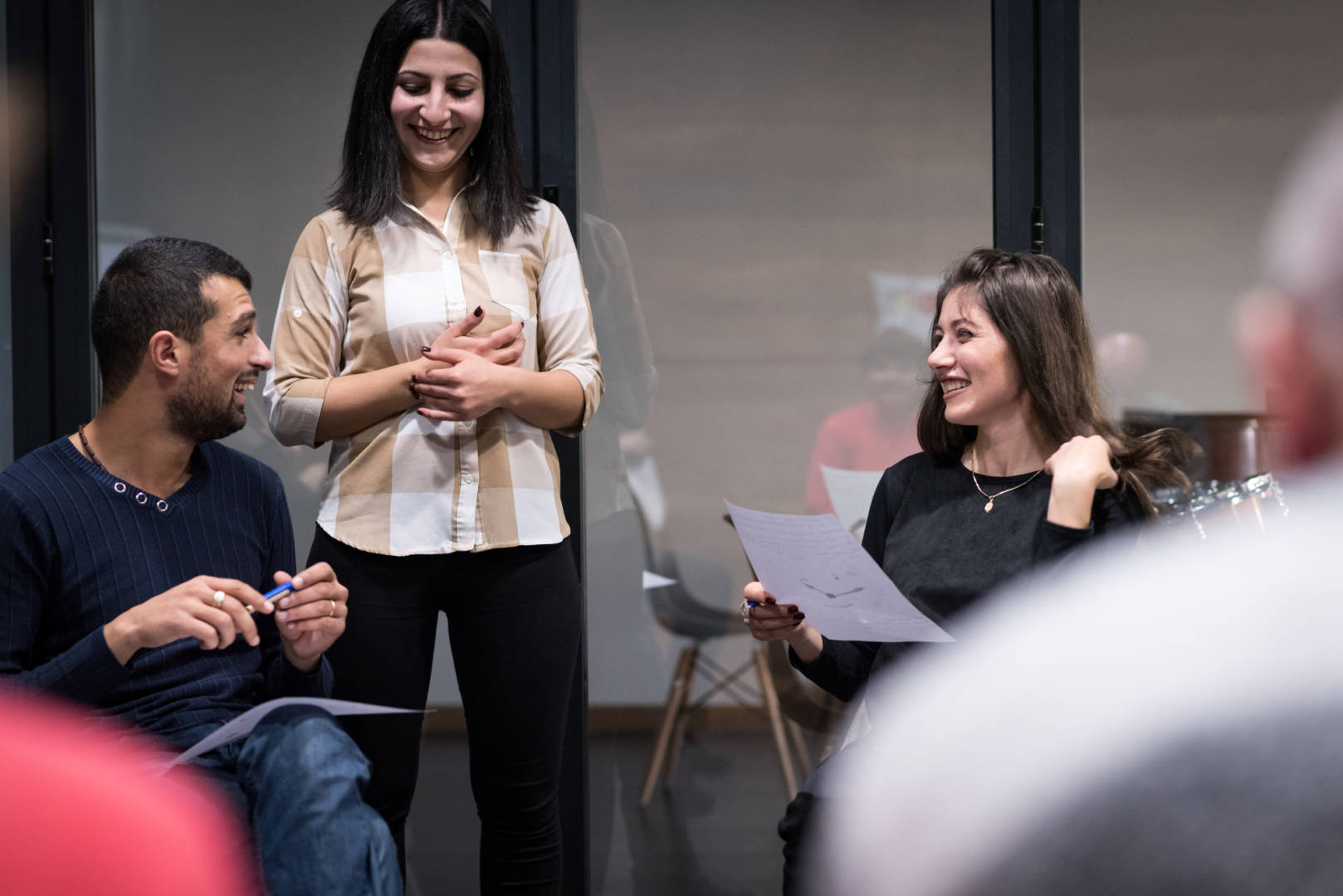
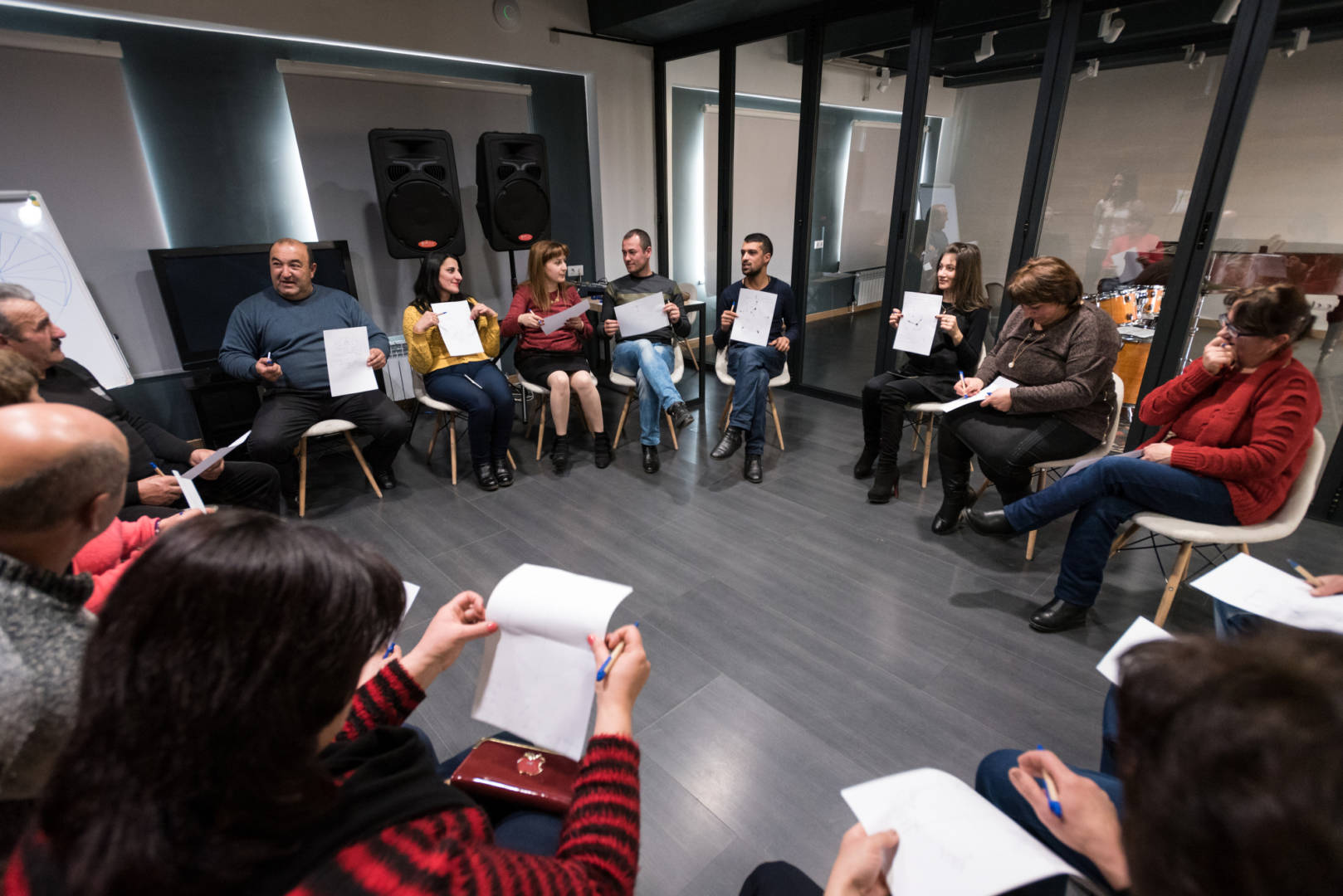
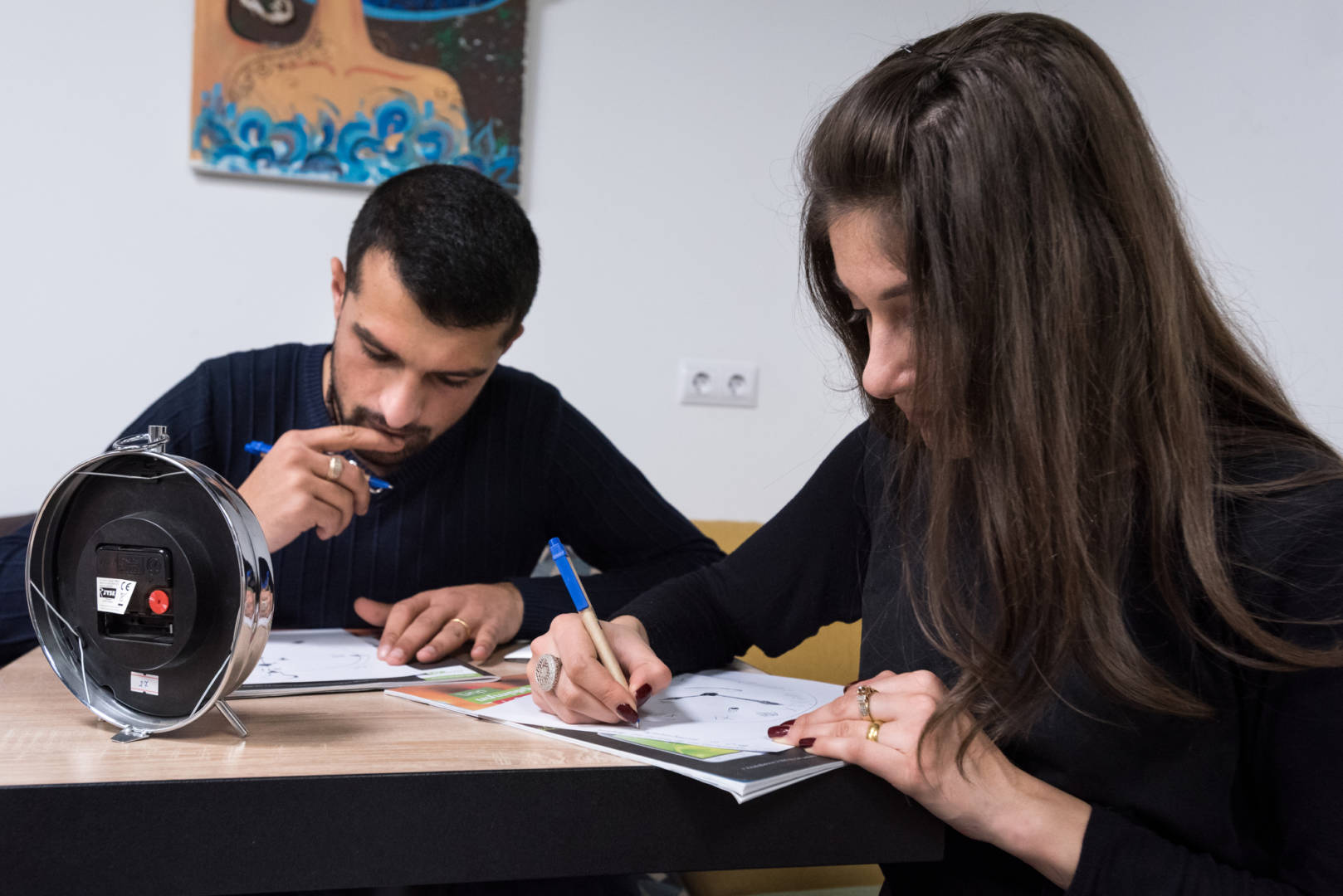
One Caring for Equality session particularly rattled Mikael. Arpine talked to the group about the statistics in Armenia around prenatal sex selection and the bias against girl children.
“For me, that was something unrespectable … and unacceptable,” Mikael says. He began to think back to the neighborhood where he lived as a child. There was only one girl. Now he thinks he knows why.
Gohar is more empowered and outspoken as a result of the training. Before, she never talked to others about the value of women, but now she feels encouraged to speak out more and try to change others’ mindsets. And she wants to tear down gender walls.
“I would like my girl to become a police officer,” she says. “I would like this society to be open to that.” And Mikael? He’s had a change of heart about their pregnancy. He’s moved from the bitter disappointment of the ultrasound to a man now impatiently awaiting the arrival of a precious baby girl.
Raising healthy children
World Vision’s Go Baby Go! program offers parents nutritional and health-related training to ensure children receive the best care in their critical first years. The learnings don’t stop with physical health, though.
Many adults in rural Armenia subscribe to the belief that children are best seen and not heard, an idea that’s been passed from parent to child for generations. But World Vision is changing that view in its sponsorship communities.
Along with nutritional advice, World Vision staff teach parents child-rearing techniques that help them understand the value of engaging more with their children — learning how to listen and help them work through their problems.
Satenik Simonyan, 27, and her husband, Hovsep Mirzoyan, 37, are well equipped with these tools thanks to their participation in the Go Baby Go! program.
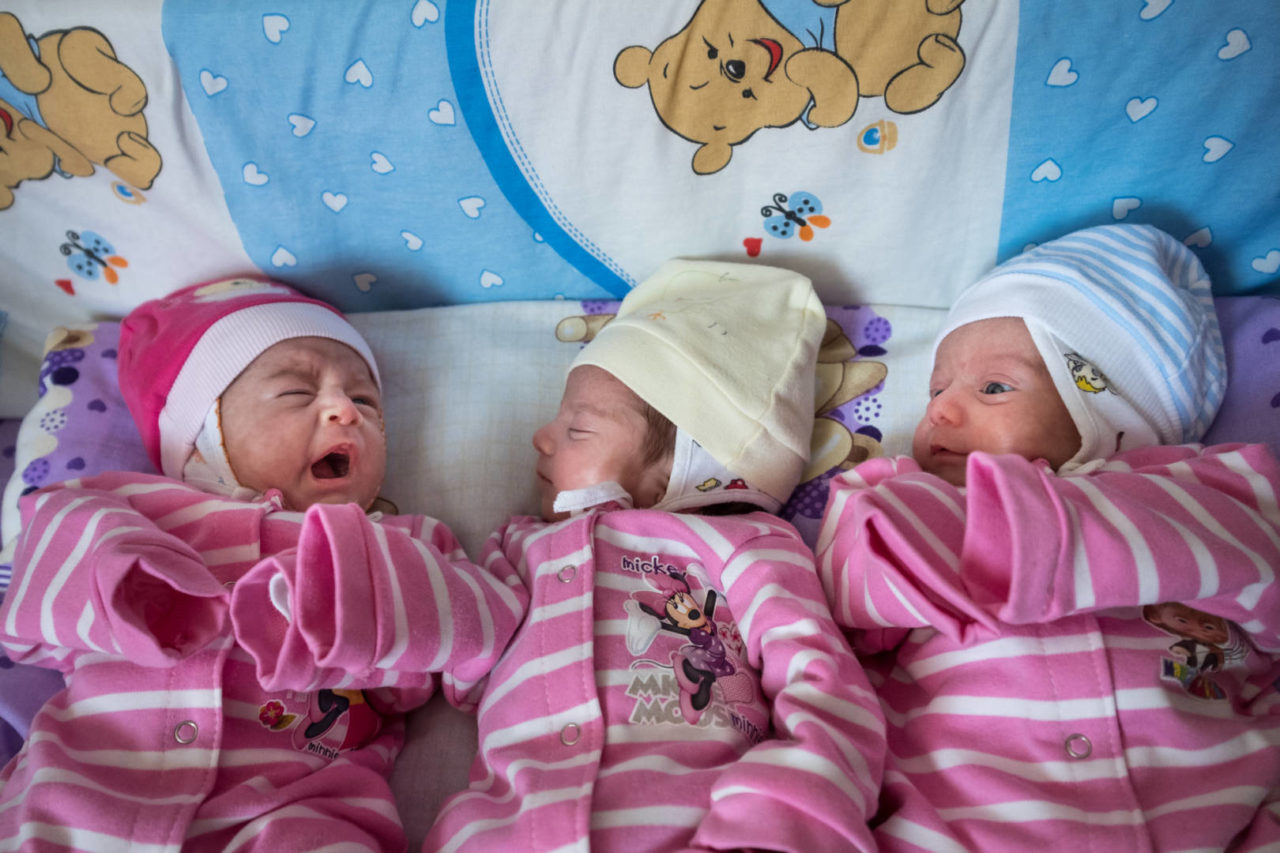
Satenik started with the program two years ago when World Vision offered it in Amasia in northwestern Armenia.
“I was interested in information they were going to provide because I had a small child, and I wanted to know how to engage him,” she says. That child was 5-year-old Mickael — a serious, quiet boy with an infrequent but winning smile.
World Vision invited fathers to participate in the program as another way to continue to change thinking about traditional gender roles. This is key because in rural communities, men see the daily care of children as women’s work.
Hovsep had recently returned from two years working in Russia. In this remote corner of Armenia, the harsh conditions and winters that stretch up to half a year limit agricultural work. A few fortunate men are hired for construction jobs, but many husbands migrate to Turkey or Russia in search of employment.
After working two years in Russia, Hovsep saw that he and Mickael acted more like neighbors than father and son. “I felt that wall that was between us,” he says. “At first I was getting angry more often.” The Go Baby Go! training came at the perfect time for him, since it happened as he was returning home.
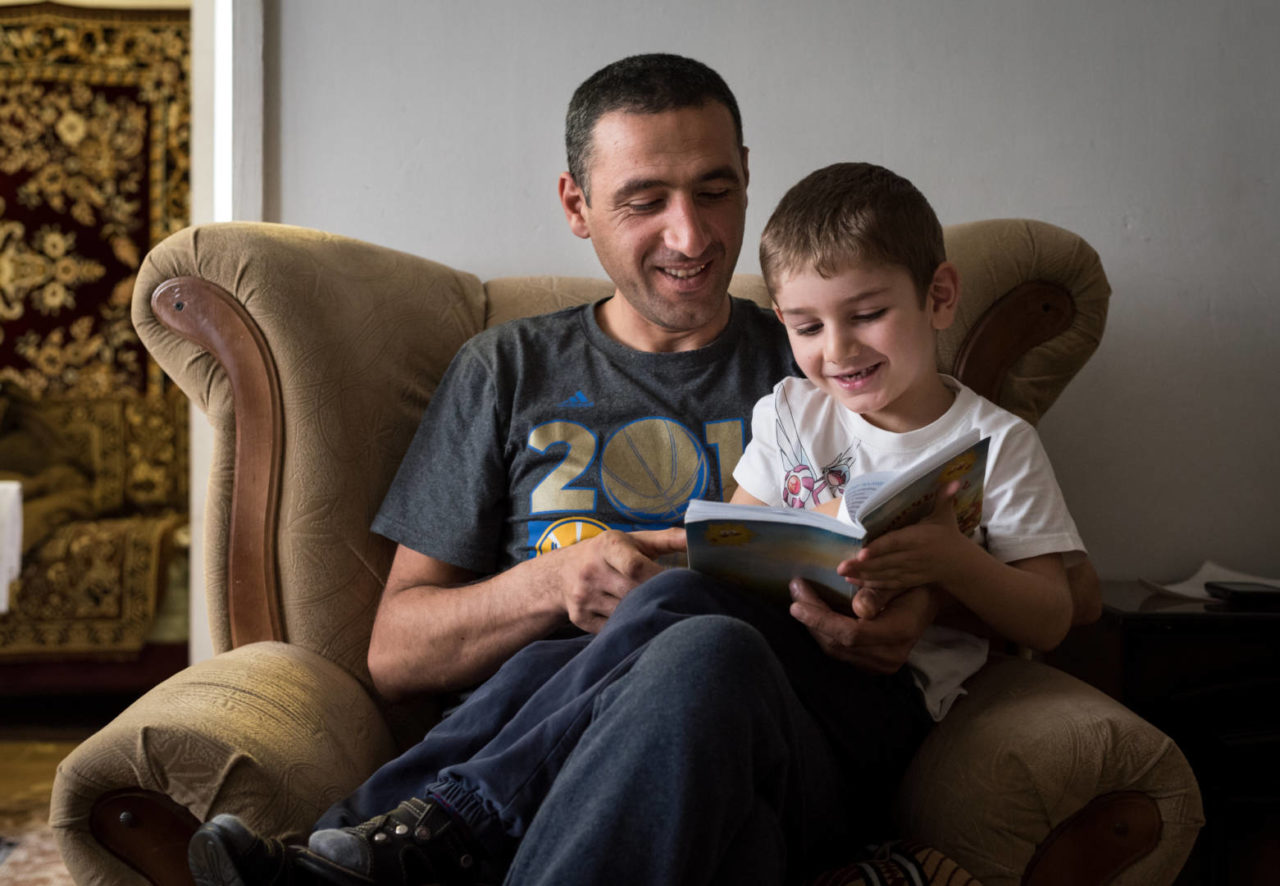
New information changed his approach. “I’ve heard a lot of possibilities of other ways of interaction,” he says. One connection for Hovsep was sharing music with Mickael, which he has learned “helps his mental development.” Mickael loves to listen to a CD of his favorite music that his father created for him.
Hovsep and Satenik also learned other imagination-building techniques from World Vision staff — like the fact that when they read a fairy tale to Mickael, they can change it a bit each time.
They’ve also learned not to only lay down the law with Mickael, but to take time explaining rules and decisions. This helps build trust and understanding.
“Now we are paying attention to his opinion,” says Satenik. They see and treat him as an individual who deserves to be heard.
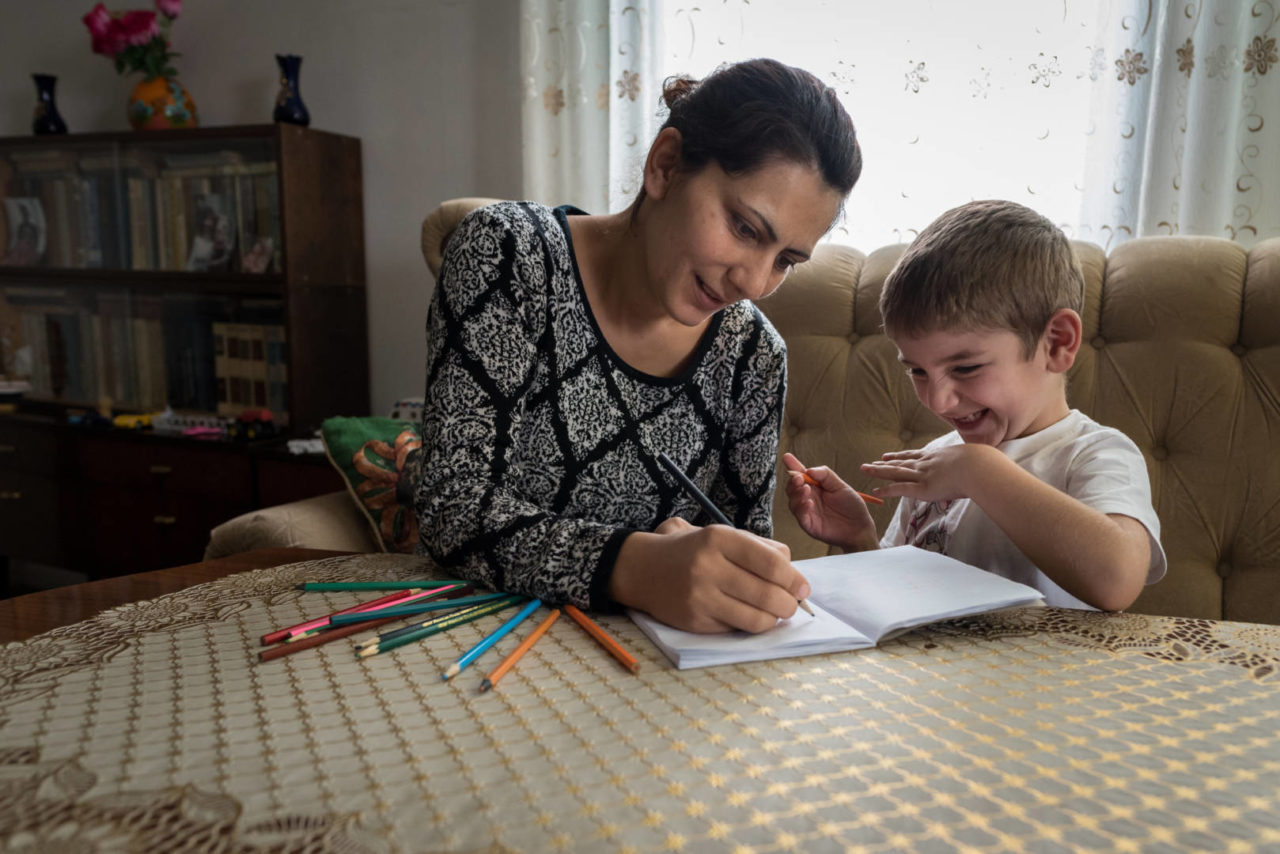
They must have been listening intently when young Mickael expressed his desire for brothers and sisters. Hovsep and Satenik soon learned they were expecting twin daughters.
But they got more than they expected.
One week before the babies were due, the couple got the news there was a third girl who’d been hidden during previous ultrasounds.
“We [were] very surprised,” says Hovsep. “We had one week to [adjust to] that idea.”
Luckily, they now have all the tools they’ve learned from Go Baby Go!, and they feel much more equipped for the challenges of suddenly raising four children.
Developing parenting skills
To create a loving environment for their children, parents need to also understand their own importance and feel understood. To enable this, World Vision helps religious leaders learn effective ways to support parents.
When apostolic priest Father Psak Mkrtchyan first came to Chambarak in eastern Armenia, he found people whose hope had crumbled due to war, depression, and the pain of poverty. Seven decades of communist rule had left many people cut off from their religious roots — the church.
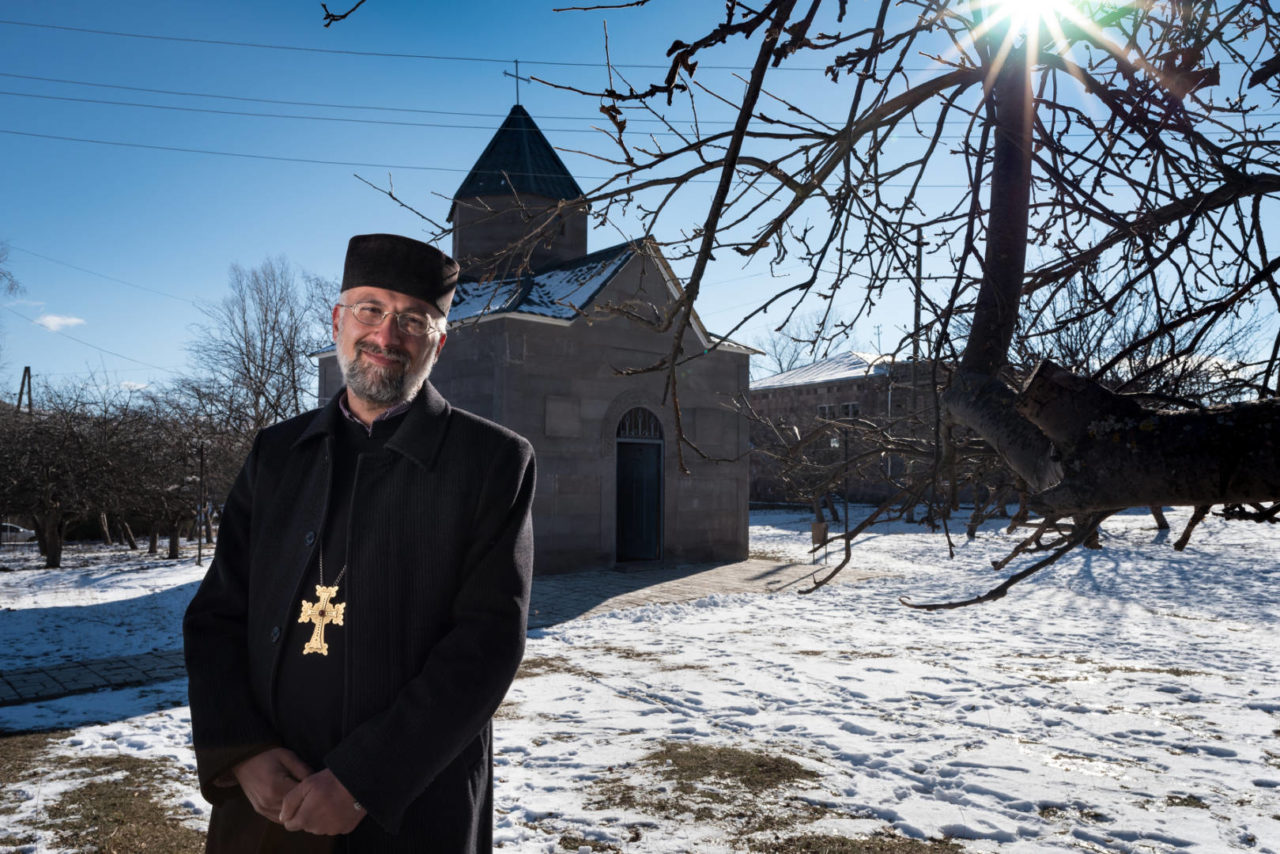
In 2011, World Vision started working in Chambarak, and Father Psak found an ally with a mission similar to his own — to help struggling families.
World Vision’s Celebrating Families curriculum helped him do just that. First, it gave Father Psak and other priests the tools they needed to engage with vulnerable families. “I discovered the inner soft souls of the people,” he says.
The training allowed him to better understand the causes of families’ needs and conflicts. “[It is] a way to have glasses to look better on the family,” he says. Knowing they were seen and acknowledged helped Father Psak’s parishioners understand how important they are to him and to the World Vision staff.
One of the families he sought to help was Hermine Mkhitaryan and her three children. Hermine had lived with her husband and family in Yerevan until her husband went to Russia to find work.
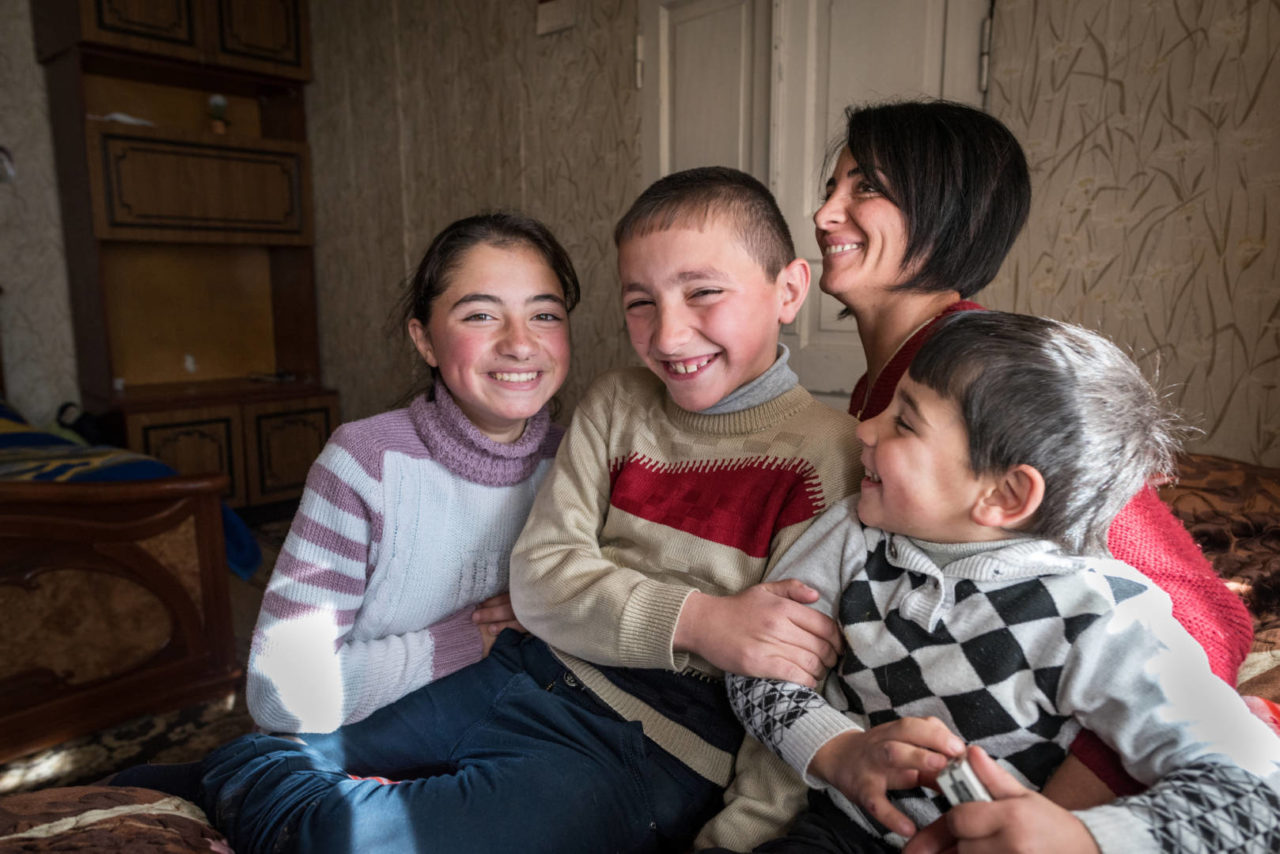
Eight months later, she learned he wasn’t coming back. Sadly, this is an all-too-common occurrence. Men who have migrated for employment often abandon their families, leaving them without a much-needed father and financial support.
Hermine knew she couldn’t continue to pay rent on their Yerevan apartment, so she moved her family nearly 75 miles back home to Chambarak.
From the day Father Psak met Hermine and her three children, he understood their fragility. “I felt a pain, and then I always kept thinking, ‘How I can help this family?’” He told World Vision’s two social workers in the area about Hermine’s family and the struggles they faced.
For Hermine, Father Psak and World Vision’s staff were a lifeline.
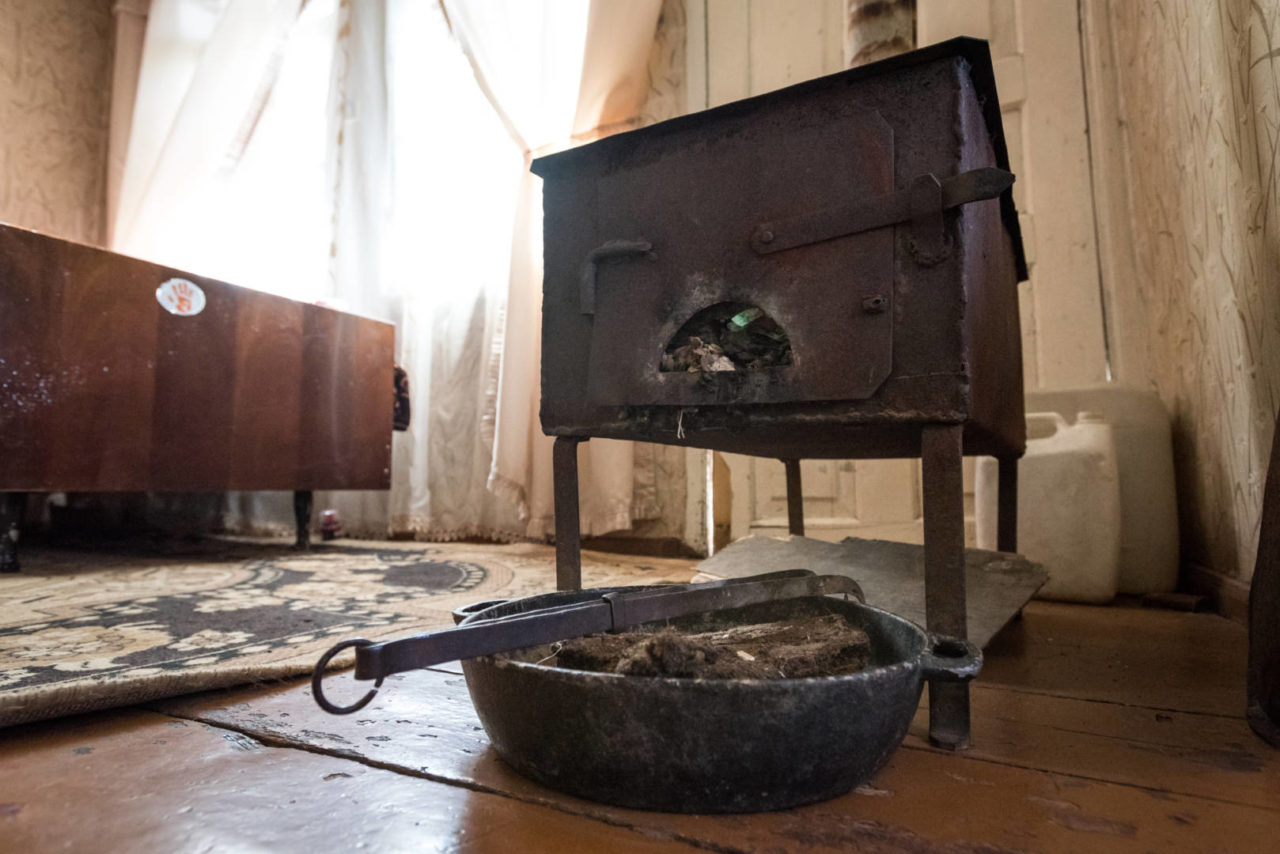
“That was a very difficult time for me,” she says. “I felt a responsibility for three children, starting from everything — from coats to winter heating to send[ing] them to the schools.”
Her anxiety often resulted in anger toward her children — an anger that sometimes turned physical. But Hermine soaked up the care she received from the priest and the social workers. She appreciated having someone else to discuss her problems and seek solutions with.
She took the Celebrating Families training geared toward parents and learned ways to improve life for herself and her children.
“I must say that before I used to not listen to [my children],” Hermine says. “When they used to talk, I would say a rough word and interrupt them.” Now she’s learned how to encourage them to express themselves. She’s seen her children’s self-esteem blossom under this new approach.
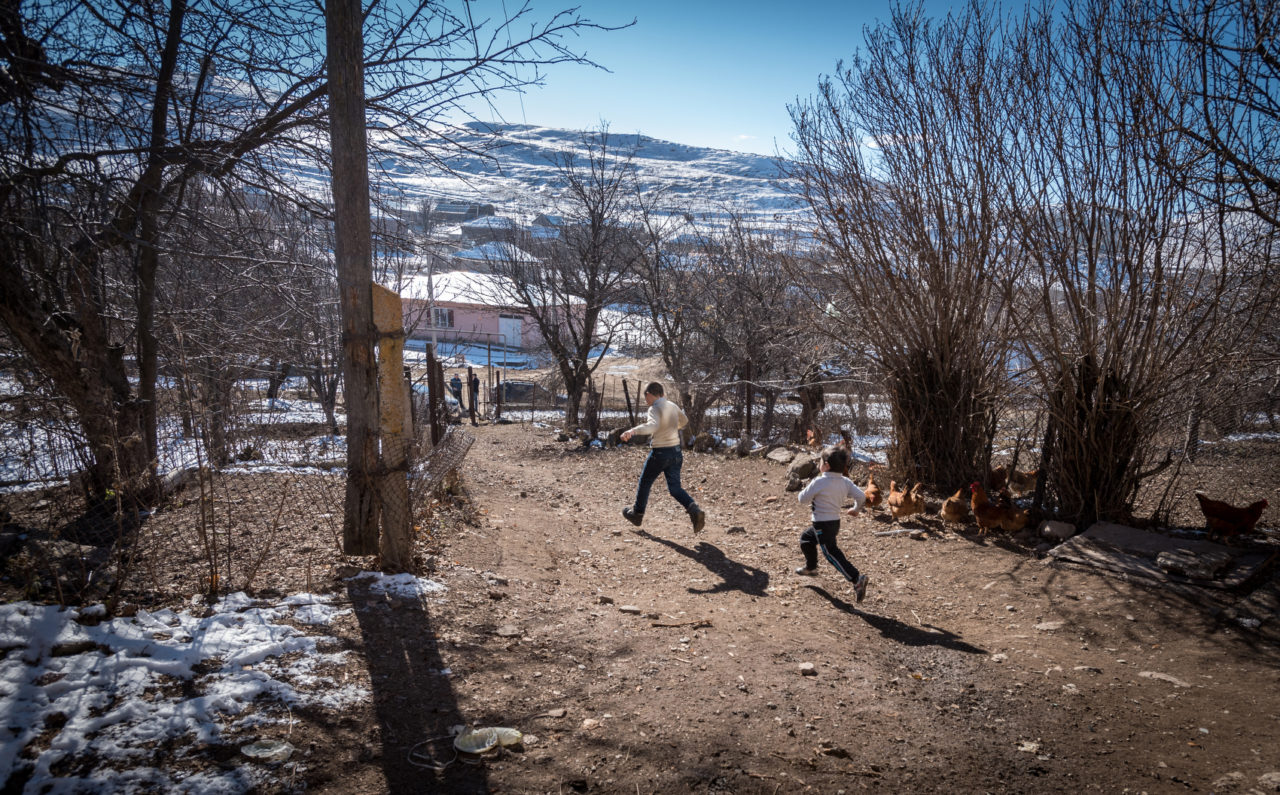
Her daughter and oldest child, 12-year-old Tatev, has noticed the change in her mother. “I remember that before she was becoming angry very often. … There were many prohibited things for us before. Now I see the freedom,” she says. “The friendship is inside our relationship.”
Father Psak has great hopes for Hermine and other Celebrating Families parents. He sees them as pioneers who can pass on what they’ve learned to other families — giving more moms and dads a network of support in facing their struggles.
Empowering youth
Pioneers is likewise a great word for the teenagers participating in World Vision’s IMPACT club in Amasia. These empowered teens speak out and engage in civic activities. The club, funded by child sponsorship, started two years ago. In that time, the youth have been able to practice public speaking and debating skills.
Their club setting may look like a typical classroom with modular desks in vivid reds, blues, and greens, but these passionate young people are anything but typical. They’re here to change their community and maybe even, one day, the world.
“I’m coming here to solve some problems. I wanted to be here to listen to what my peers are thinking about and study something new that I will never have in my school,” says 13-year-old Geghetsik Manukyan. “It will help me later to do good in my community and my whole nation.”
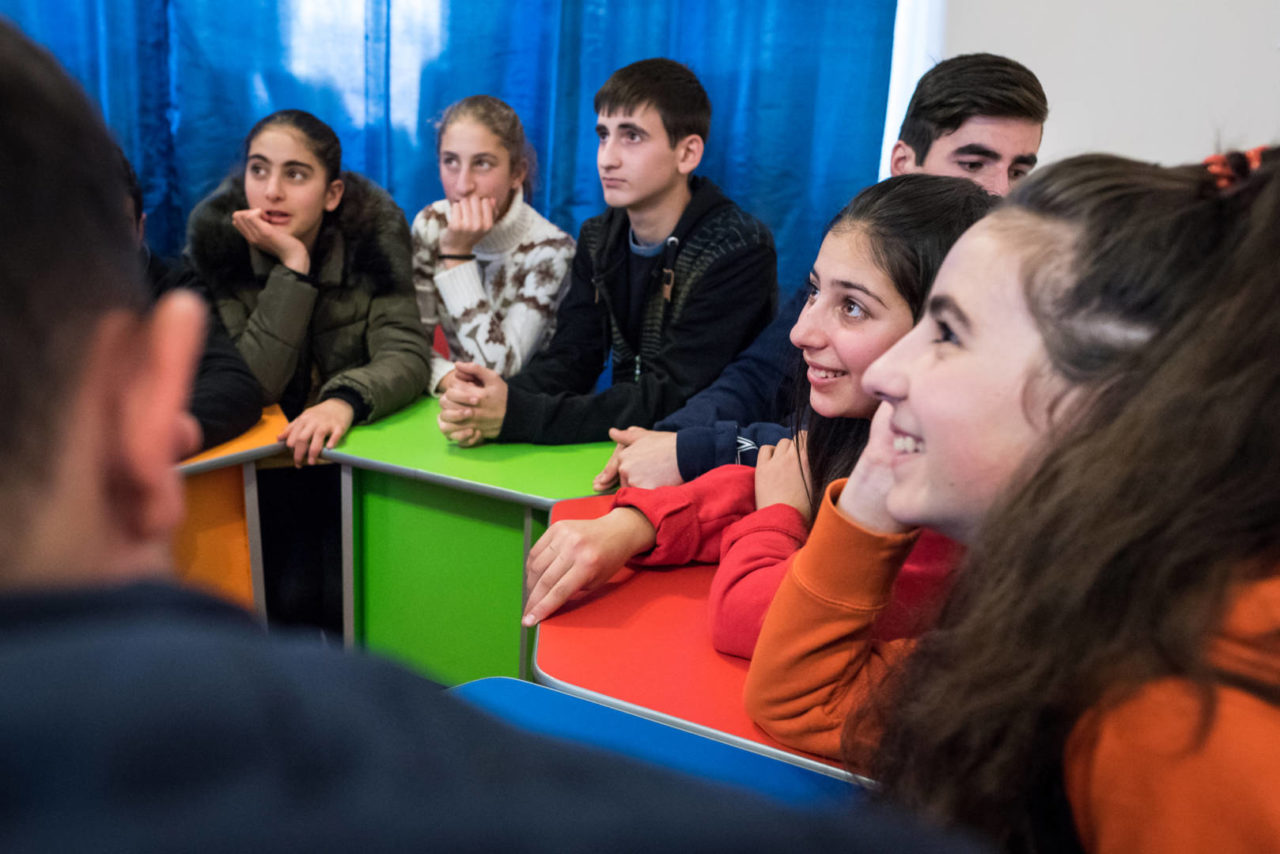
This is a huge step forward in a country where children were once discouraged from speaking out. “We believe that we are able to change something. If we don’t believe in that, we can never go forward and solve any type of issues,” says 16-year- old Tovmas Vardanyan.
Already these young people, ranging in age from 10 to 18, have improved lives for their neighbors in Amasia. They’ve organized a field trip for elderly community members, taking them to church and organizing a film viewing.
They cleaned up the area behind their classroom building and created a place to play for local children. And last year, they decorated a fir tree in the town square to provide more festive Christmas and New Year’s celebrations.
Ani Arakelyan, 14, says, “What I love most in the IMPACT club — here there is no wrong opinion.”
One of those opinions led to their current community project. One club member saw a painting of the universe on the internet and wanted to do something similar in the local school.
“We loved the idea. It was approved by the school and the other children,” says IMPACT club co-leader Lusine Arakelyan. Club members are now painting a mural of the universe on a wall in the school.
“It will help the schoolchildren to understand the universe and the planet Earth. [It] will orient them toward science,” says Narek Tutkhalyan, World Vision’s youth coordinator for the Shirak province, where the town of Amasia is located.
And it will encourage the growth of the club. Lusine adds, “They wanted to leave something from IMPACT in the school to attract other students.”
Building job skills
Armenia’s booming tech industry offers an opportunity to keep youth like these in Armenia instead of emigrating for work. Narek says there are nearly 3,000 information technology jobs available in Armenia, and he wants to prepare youth with the skills to get those jobs.
As part of World Vision’s youth projects in the area, he created a robotics club for teenagers, which started over a year ago thanks to a partnership between LEGO® and World Vision’s sponsorship program.
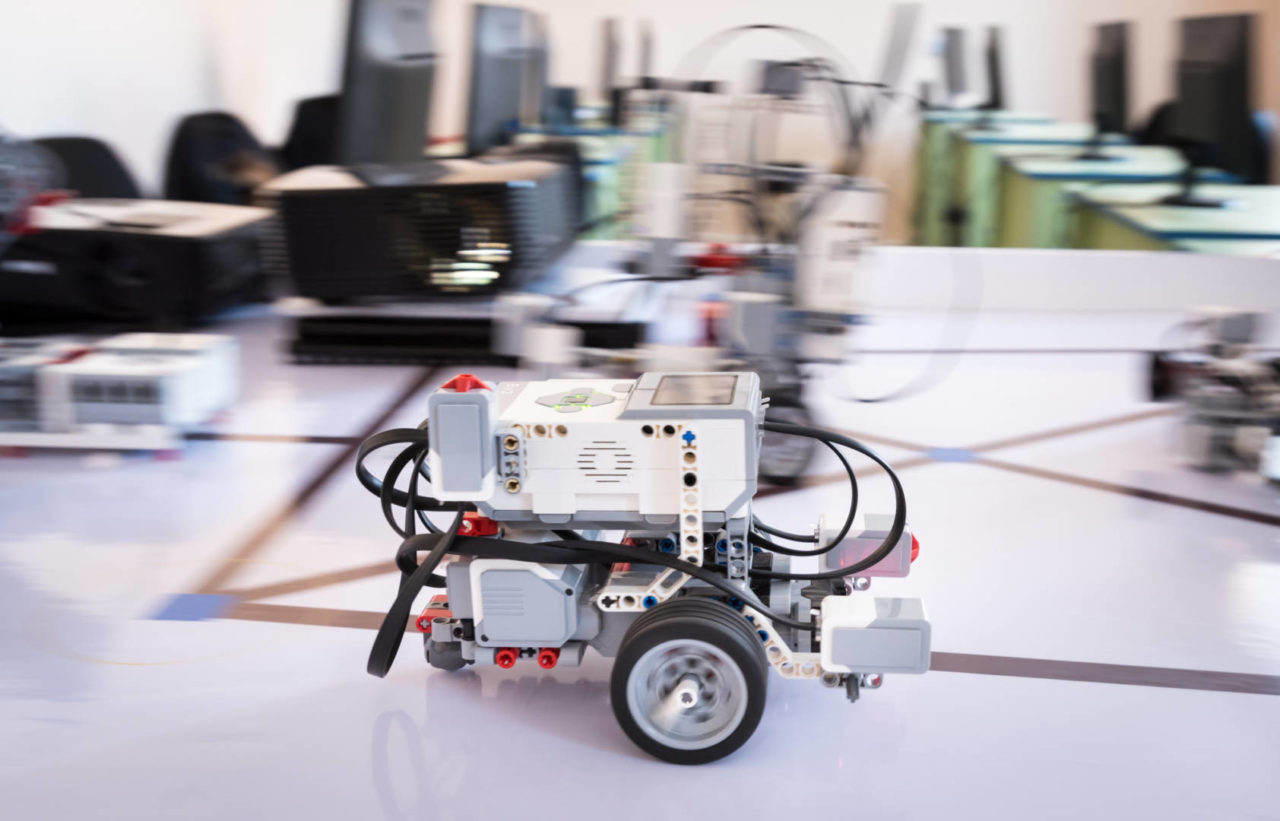
The teens meet in a room down the hall from the IMPACT club. As many as 26 of them fill the space, working in groups to offer ideas while one person types furiously.
It’s not all computer work. Some build car-like creations out of LEGO robotic components. Today’s assignment? To create a vehicle programmed to detect walls, then turn to avoid them.
Narek wants to help young people secure stable employment through this training. But he also wants the club to continue to break down gender barriers. He says, “It’s more accepted that boys do [IT work]. We want to show that’s not the way it should be. Girls should be involved.”
Anahit Harutyunyan, 16, joined the club when it opened last year. A couple from Arizona had been sponsoring her for a few years. She’d always loved to draw and would send letters and drawings to them. They responded, encouraging her to keep up with the artwork and to stay focused on her studies.
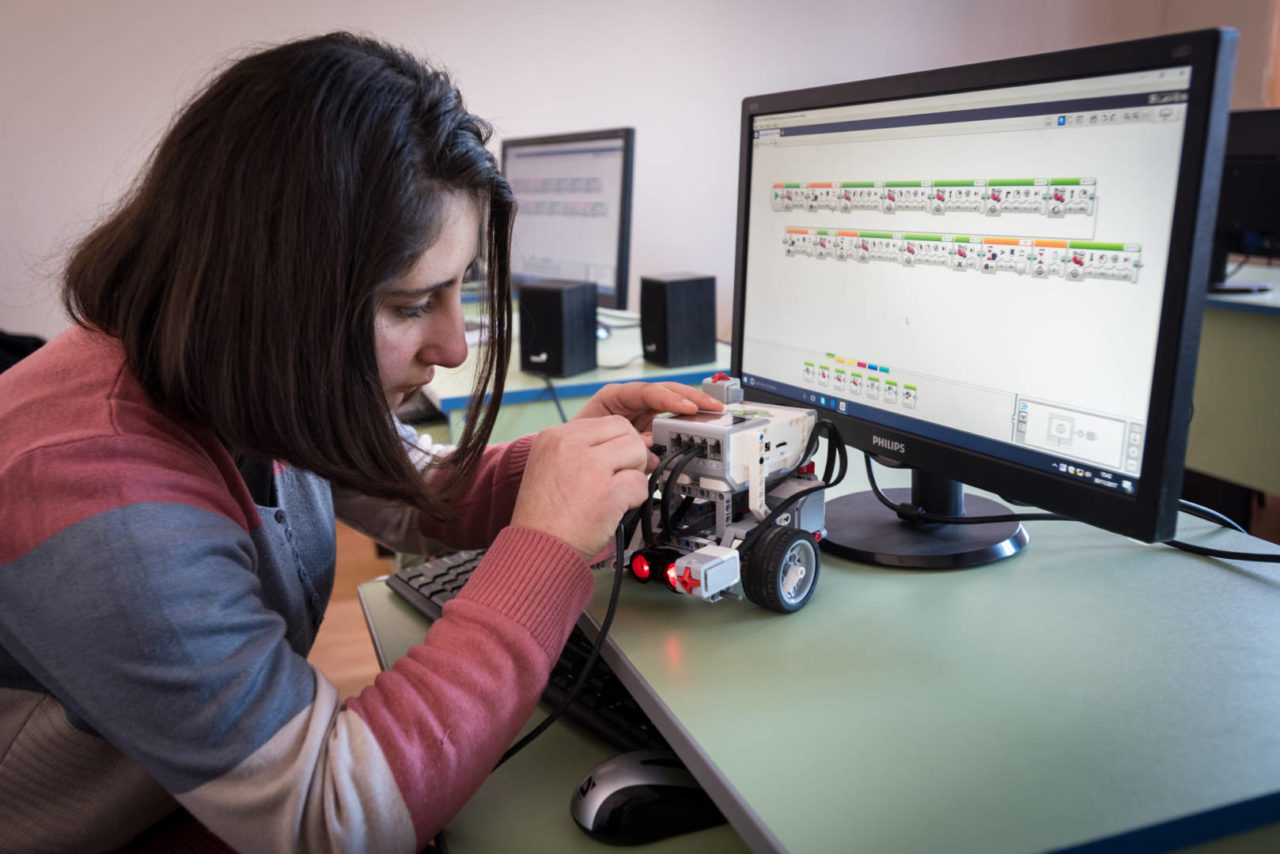
After watching the “Transformers” movies, she became interested in robotics. One of her favorite characters from the series is Optimus Prime, who leads the heroic Autobots and displays a strong sense of honor, justice, and moral courage.
When Anahit first started in the club, she was too shy to talk to others, but the instructor, Arsen Yayloyan, encouraged her to speak up. “We are all friends,” he told her. “Feel free to express your opinions.”
Her mother, Laura Tonoyan, has seen Anahit transform right before her eyes thanks to the robotics club.
“She’s become more joyful. Before she didn’t used to have contact with peers,” says Laura. “She’s become more active.”
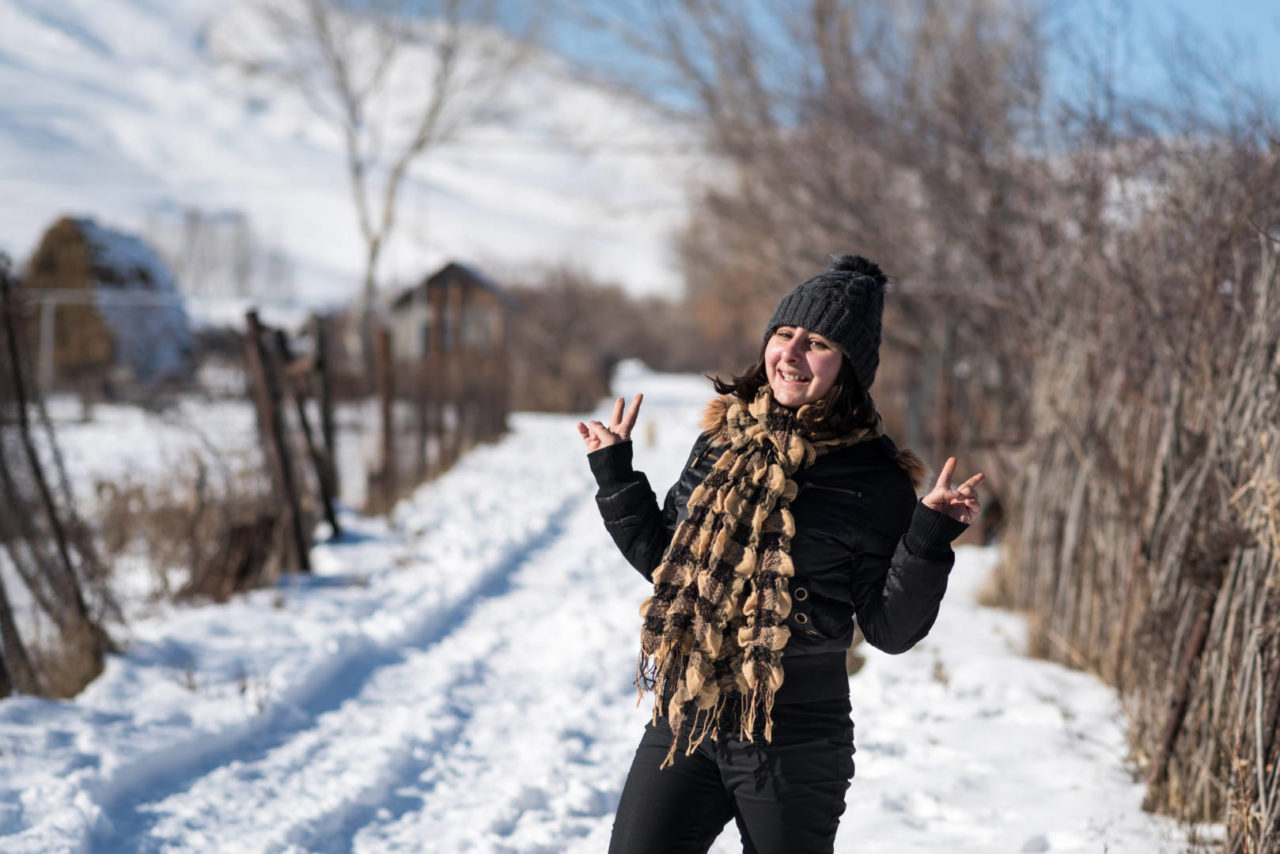
In September 2017, Anahit and her team traveled to nearby Gyumri to participate in a robotics contest with their creation, a garbage-collecting robot. Five teams from around the region competed, but Anahit and the Amasia team took home the prize.
Anahit has blossomed not only in the robotics club but also in other areas of her life.
In October 2017, she participated in World Vision’s advocacy group.
The students identified a problem: Their computers didn’t work, so students couldn’t complete their lessons.
They discussed the issue with the mayor and the school director, who said they would help. Anahit, a formerly shy girl who could barely speak to her
classmates, went to Yerevan alongside other advocacy group members to seek assistance from a telecommunications company. The company promised to help by year’s end.
Anahit enjoys improving her community. “We’re already solving that problem. It makes me feel happy,” she says.
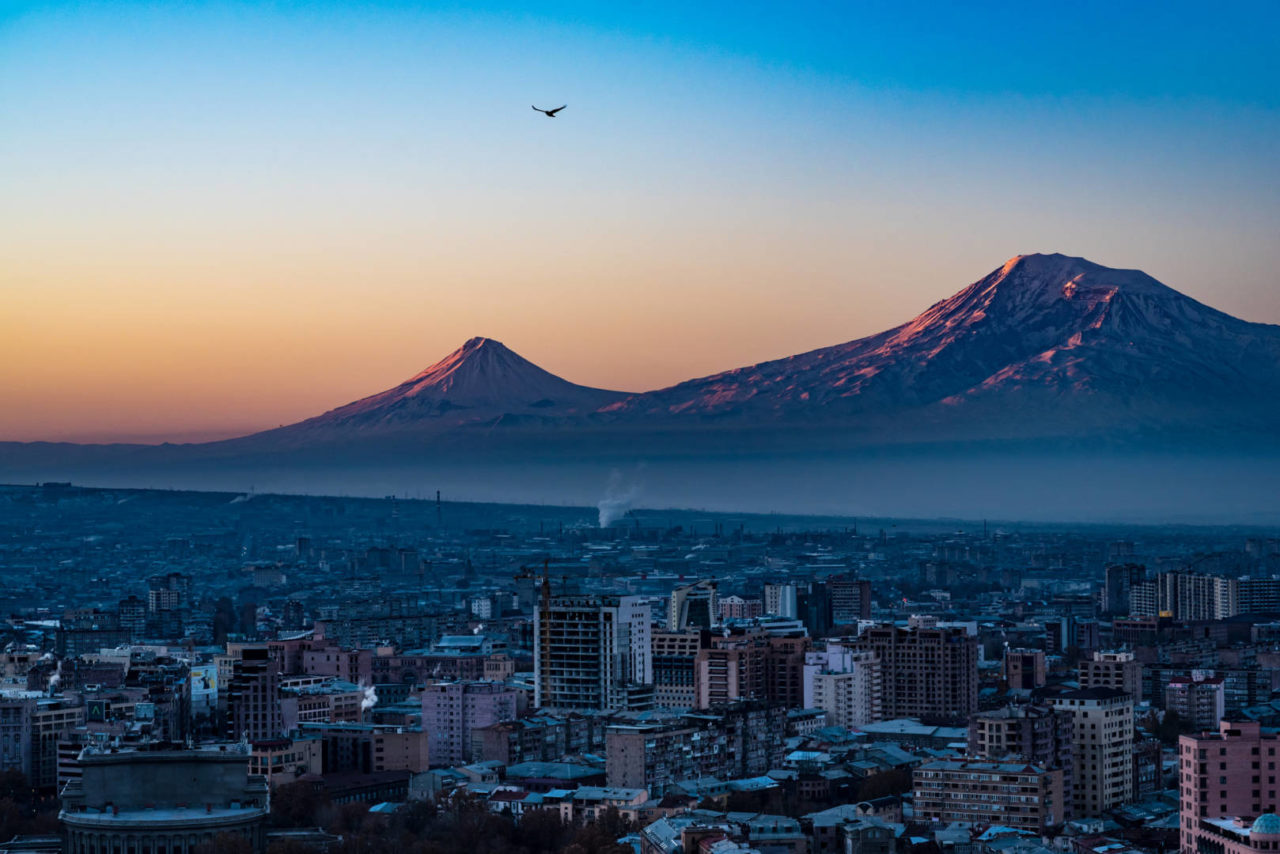
Like Optimus Prime, she’s fighting for justice and positive change. Meanwhile, World Vision is right there with her, working alongside parents, church leaders, and teachers to guard her childhood and that of her peers.
One day as adults, they’ll think back on happy childhood memories — time spent playing games and laughing with parents, working alongside friends and caring adult mentors to problem-solve, and expanding their vision for the future. Then they can pass that happy legacy on to their own children.
Zhanna Ulikhanyan contributed to this story.
